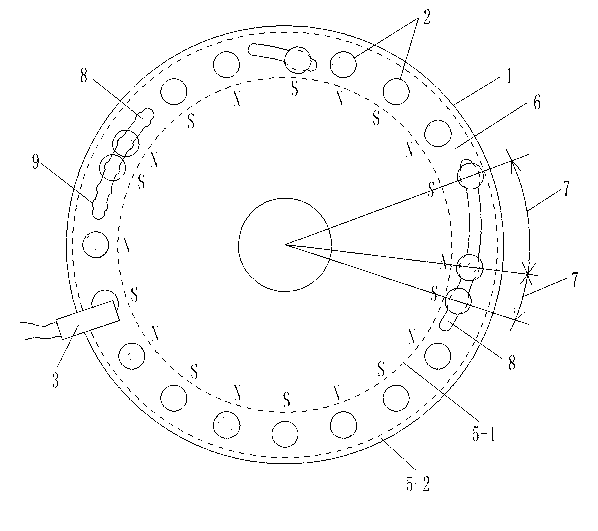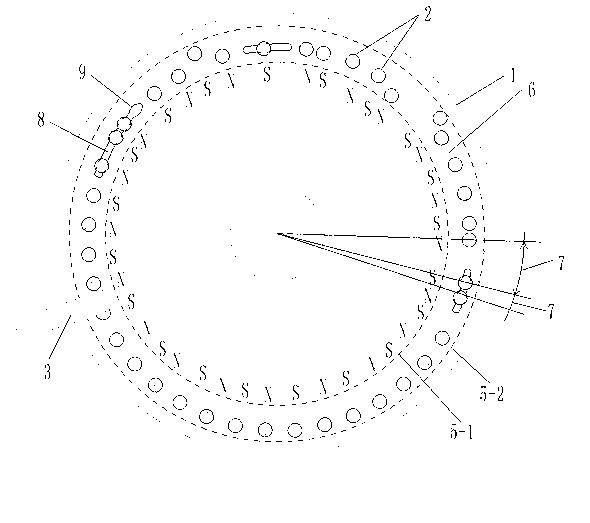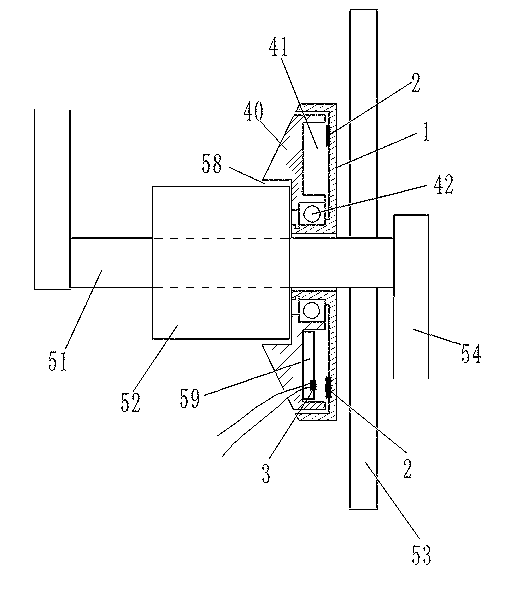Power-assisted bicycle using sensor with position-adjustable magnetic blocks in casing
A technology for assisting bicycles and sensors, which is applied in the use of electric/magnetic devices to transmit sensing components, convert sensor outputs, instruments, etc., can solve the problems of lack of control signals, inability to have both, and permanent magnets unable to indicate the rotation position of the pedals.
- Summary
- Abstract
- Description
- Claims
- Application Information
AI Technical Summary
Problems solved by technology
Method used
Image
Examples
Embodiment 1
[0134] Embodiment 1. A power-assisted bicycle with adjustable sensors in the position of multiple magnetic blocks in the housing
[0135] Such as figure 1 , 3 , 4, 6, the sensor among the present invention is installed on the central axis 51 of existing electric bicycle, the signal output line of sensor is connected with the motor controller 29 of electric bicycle, just obtains power-assisted bicycle of the present invention.
[0136] 1. The components and structure of the electric bicycle related to the installation of the sensor: the electric bicycle has a central shaft 51, and the middle section of the central shaft 51 is covered with a bushing 52, and the central shaft 51 is connected to the bushing 52 in rotation; the chain disc 53 is fixed on the central shaft 51 The two ends of the central axis 51 are respectively fixed with pedals 54; the inner surface of the casing 52 is connected to the central axis 51 in rotation, and the outer surface of the casing 52 is fixedly ...
Embodiment 2
[0161] Embodiment 2, a power-assisted bicycle with adjustable sensors for multiple magnetic blocks in the housing for high density
[0162] Such as figure 2 , 3, 4, 6, the diameter of the annular groove rotating disk 1 in the hollow ring 41 is 10.0 centimeters, and 40 permanent magnet blocks 2 are established at the annular groove rotating disk 1, and the diameters of the 40 permanent magnet blocks 2 are respectively 0.6 centimeters, The magnetic flux is 146---279(B·H)max / KJ·m -3 one of the values in . Hall 3 keeps a distance of 0.2 cm from each permanent magnet 2 in the rotating state, so that when each rotating permanent magnet 2 passes through Hall 3, Hall 3 can generate a corresponding rectangular wave electric signal output. The circle where the arc of the arc-shaped bar-shaped short groove 8 is located and the inner circular locus 5-1 are concentric circles. The structures of other rotating disk 1, permanent magnet block 2, and Hall 3 are the same as those in embo...
Embodiment 3
[0163] Embodiment 3. A power-assisted bicycle with adjustable sensors for multiple magnetic blocks in the housing with a specific circuit
[0164] Such as figure 1 , 3 , 5, 6, as in embodiment 1, the sensor includes a sensing element connected in sequence, a booster model processor 21, a digital-to-analog converter 27 and an operational amplifier 28;
[0165] [1] The Hall 3 in the sensing element is UGN3075; the structure of other elements and elements in the sensing element is the same as that in Embodiment 1;
[0166] [2] The auxiliary model processor 21 selects the single-chip microcomputer 31 to complete all functions, and the single-chip microcomputer 31 selects AT89S52. That is, the AT89S52 single-chip microcomputer 31 completes all functions of the analog-to-digital conversion and the wave width identifier 22 , the power-assisted starting point selector 23 , the magnet speed calculator 24 , the power-assisted model memory 25 and the power-assisted model calculator 26...
PUM
 Login to View More
Login to View More Abstract
Description
Claims
Application Information
 Login to View More
Login to View More - R&D
- Intellectual Property
- Life Sciences
- Materials
- Tech Scout
- Unparalleled Data Quality
- Higher Quality Content
- 60% Fewer Hallucinations
Browse by: Latest US Patents, China's latest patents, Technical Efficacy Thesaurus, Application Domain, Technology Topic, Popular Technical Reports.
© 2025 PatSnap. All rights reserved.Legal|Privacy policy|Modern Slavery Act Transparency Statement|Sitemap|About US| Contact US: help@patsnap.com



